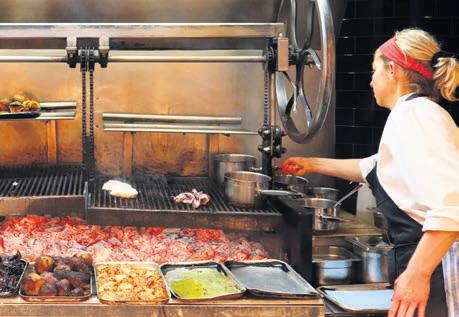
2 minute read
Food inflation soars to highest level on record
from Wednesday 1 February 2023
by cityam
LAURA MCGUIRE
FOOD inflation has reached its highest level on record, with the sector predicting no stall in price increases throughout the year.
Figures published in the British Retail Consortium’s (BRC) shop price index show food inflation rose to 13.8 per cent in January, up from 13.3 per cent in December. This rise has pushed it above the three-month average rate of 13.2 per cent.
Separate data from Kantar yesterday showed food price increases mean Brits are now facing an extra £788 on their annual grocery bills.
The BRC reported a rise in costs of ambient food, such as canned vegetables and soups, which rose to 11.3 per cent in January, up from 11.0 per cent in December.
“Retail prices rose in January as discounting slowed and retailers continued to face high input costs. Ambient food inflation accelerated the most as wholesale and bulk prices grew, particularly for sugar and alcohol,” said Helen Dickinson OBE, chief executive of the British Retail Consortium.

Additionally, fresh food inflation also increased in January to 15.7 per cent, up from 15.0 per cent in December.
Dickinson added: “Fresh food prices also remained high due to increased food production costs as well as elevated wholesale fruit and vegetable prices. Meanwhile, clothing and footwear prices eased, so customers were able to replenish their wardrobes with some bargains during the January sales.”
Charles Allen, retail analyst at Bloomberg Intelligence, told City A.M. that food inflation is “quite close to its peak” though it may be more persistent through the year as some “hedged costs within the supply chain unwind and have to be passed through”.
Speaking to City A.M., George Phillips, commercial director at Wanis International Foods, a food manufacturer and distributor, said that, while the rate of inflation witnessed in 2022 looks to be slowing down, the sector doesn’t “anticipate prices to come down anytime soon”.
Phillips explained: “This is driven by various factors including the price of packaging and components still increasing, mainly driven by increased energy costs in production and raw materials.
So, glass and cardboard prices are still very high, and supply is still an issue.”
Ofgem boss warns over energy sector after Shell hints at UK exit
NICHOLAS EARL
SHELL’s potential exit from the energy retail market raises questions over the industry’s attractiveness for businesses, Ofgem chief executive Jonathan Brearley has warned.
The watchdog boss told the BEIS Select Committee that there needed to be a credible pathway to profit for energy suppliers.
He said: “It remains a concern to us around the long-term sustainability and attractiveness of this market.”
Ofgem has announced a raft of reforms to clean up the energy sector including fit and proper person tests and capital adequacy requirements, as it looks to clean up the industry.
Brearley’s comments were in response to questions from committee chair Darren Jones about Shell’s longterm future in the home retail market after last week it announced a strategic review of its retail operations in the UK, Germany and Netherlands.








